Monday, December 19, 2011 at 9:58 AM
9:58AM
 Monday, December 19, 2011 at 9:58AM
Monday, December 19, 2011 at 9:58AM
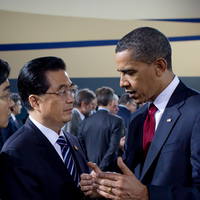 Much of what drives America’s current phobias regarding China stems from the dual -- and fantastically linear -- assumptions of America’s terminal decline and China’s perpetual ascension. We are thus led to believe that China no longer needs the United States and that America, in turn, can do nothing -- short of increasing military pressure -- to constrain the Middle Kingdom’s rise to global hegemony. On all scores, nothing could be further from the truth. China and the United States suffer a level of strategic interdependency that is vast and shows no signs of reduction. Simply put, America cannot stay rich without China, and China cannot get rich without America.
Much of what drives America’s current phobias regarding China stems from the dual -- and fantastically linear -- assumptions of America’s terminal decline and China’s perpetual ascension. We are thus led to believe that China no longer needs the United States and that America, in turn, can do nothing -- short of increasing military pressure -- to constrain the Middle Kingdom’s rise to global hegemony. On all scores, nothing could be further from the truth. China and the United States suffer a level of strategic interdependency that is vast and shows no signs of reduction. Simply put, America cannot stay rich without China, and China cannot get rich without America.
Read the entire post at World Politics Review.
Monday, December 12, 2011 at 9:36 AM
9:36AM
 Monday, December 12, 2011 at 9:36AM
Monday, December 12, 2011 at 9:36AM
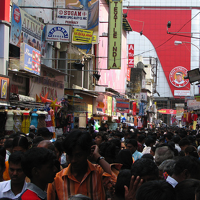 When most people think of revolutions, they imagine the overthrow of political orders. By contrast, most of what we see today in globalization’s continued expansion is not violent political revolution, but rather unsettling socio-economic revolution. Yes, when existing political orders cannot process that change -- and the angry populism that typically accompanies it -- they can most definitely fall. This is what we have seen in the Arab Spring to date. But more often this populism leads to political paralysis in countries both democratic and authoritarian. A case in point is the recent controversy in India over Prime Minister Manmohan Singh’s plan, since scrapped, to allow multinational retail chains like Wal-Mart, Carrefour and Tesco to mount joint ventures with local firms in direct retail sales operations. The public uproar showed that at times, globalization is simply too much change, too fast..
When most people think of revolutions, they imagine the overthrow of political orders. By contrast, most of what we see today in globalization’s continued expansion is not violent political revolution, but rather unsettling socio-economic revolution. Yes, when existing political orders cannot process that change -- and the angry populism that typically accompanies it -- they can most definitely fall. This is what we have seen in the Arab Spring to date. But more often this populism leads to political paralysis in countries both democratic and authoritarian. A case in point is the recent controversy in India over Prime Minister Manmohan Singh’s plan, since scrapped, to allow multinational retail chains like Wal-Mart, Carrefour and Tesco to mount joint ventures with local firms in direct retail sales operations. The public uproar showed that at times, globalization is simply too much change, too fast..
Read the entire column at World Politics Review.
Monday, December 5, 2011 at 9:07 AM
9:07AM
 Monday, December 5, 2011 at 9:07AM
Monday, December 5, 2011 at 9:07AM
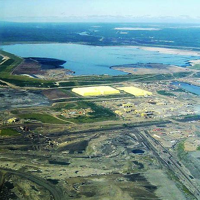 The United States is on the verge of an industrial renaissance, according to energy experts enthusiastic about technological advances surrounding the “fracking” of shale gas and the processing of “tight oil.” America is sitting on a century-worth of natural gas, and the Western hemisphere boasts five times the reserves in unconventional oil as the Middle East claims in the conventional category. Suddenly, all our fears of resource wars with China and never-ending quagmires in Southwest Asia seem to melt away, heralding with great certainty another American century based on the promise of energy independence. As “deus ex machina” moments go, this one arrives just in time for a nation magnificently down on its luck and itself.
The United States is on the verge of an industrial renaissance, according to energy experts enthusiastic about technological advances surrounding the “fracking” of shale gas and the processing of “tight oil.” America is sitting on a century-worth of natural gas, and the Western hemisphere boasts five times the reserves in unconventional oil as the Middle East claims in the conventional category. Suddenly, all our fears of resource wars with China and never-ending quagmires in Southwest Asia seem to melt away, heralding with great certainty another American century based on the promise of energy independence. As “deus ex machina” moments go, this one arrives just in time for a nation magnificently down on its luck and itself.
Read the entire column at World Politics Review.
Monday, November 28, 2011 at 9:44 AM
9:44AM
 Monday, November 28, 2011 at 9:44AM
Monday, November 28, 2011 at 9:44AM
 It is hard to think of a period in the past five decades in which this country was more painfully bereft of national leadership than it currently finds itself. On one side we have an increasingly isolated president who, as Edward Luce opined recently, “prefers to campaign than govern.” On the other is a House-controlling GOP that, in the words of Thomas Friedman, “has gone nuts.” What’s more, the highly negative campaign that 2012 is shaping up to be will secure no governing mandate for the eventual winner, meaning that things are likely to get far worse.
It is hard to think of a period in the past five decades in which this country was more painfully bereft of national leadership than it currently finds itself. On one side we have an increasingly isolated president who, as Edward Luce opined recently, “prefers to campaign than govern.” On the other is a House-controlling GOP that, in the words of Thomas Friedman, “has gone nuts.” What’s more, the highly negative campaign that 2012 is shaping up to be will secure no governing mandate for the eventual winner, meaning that things are likely to get far worse.
Read the entire column at World Politics Review.
Monday, November 21, 2011 at 10:37 AM
10:37AM
 Monday, November 21, 2011 at 10:37AM
Monday, November 21, 2011 at 10:37AM
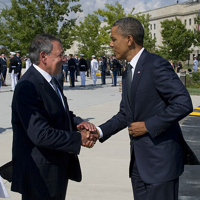 Thanks to the terrorist attacks of Sept. 11 and the two wars they spawned, it seemed like the near entirety of President George W. Bush’s two terms in office were characterized by efforts to define, harness and exploit fear. Despite living in the most peaceful, prosperous and predictable period in world history, Americans became convinced that they faced an unending era of war, impoverishment and chaos. That muddled mindset put us painfully out of touch with the rest of the planet.
Thanks to the terrorist attacks of Sept. 11 and the two wars they spawned, it seemed like the near entirety of President George W. Bush’s two terms in office were characterized by efforts to define, harness and exploit fear. Despite living in the most peaceful, prosperous and predictable period in world history, Americans became convinced that they faced an unending era of war, impoverishment and chaos. That muddled mindset put us painfully out of touch with the rest of the planet.
Read the entire column at World Politics Review.
Monday, November 14, 2011 at 11:44 AM
11:44AM
 Monday, November 14, 2011 at 11:44AM
Monday, November 14, 2011 at 11:44AM
 The International Atomic Energy Agency’s latest report on Iran’s nuclear programsurprised no one, even as it created the usual flurry of op-eds championing preventative “next steps.” As I’ve been saying for the past half-decade, there are none. Once the U.S. went into both Iraq and Afghanistan, the question went from being, “How do we prevent Iran from getting the Bomb?” to “How do we handle Iran’s Bomb?” That shift represents neither defeatism nor appeasement. Rather, it reflects a realistic analysis of America’s strategic options. With that in mind, here are 20 reasons why Iran’s successful pursuit of the Bomb is not the system-changing event so many analysts are keen to portray.
The International Atomic Energy Agency’s latest report on Iran’s nuclear programsurprised no one, even as it created the usual flurry of op-eds championing preventative “next steps.” As I’ve been saying for the past half-decade, there are none. Once the U.S. went into both Iraq and Afghanistan, the question went from being, “How do we prevent Iran from getting the Bomb?” to “How do we handle Iran’s Bomb?” That shift represents neither defeatism nor appeasement. Rather, it reflects a realistic analysis of America’s strategic options. With that in mind, here are 20 reasons why Iran’s successful pursuit of the Bomb is not the system-changing event so many analysts are keen to portray.
Read the entire column at World Politics Review.
Monday, November 7, 2011 at 8:54 AM
8:54AM
 Monday, November 7, 2011 at 8:54AM
Monday, November 7, 2011 at 8:54AM
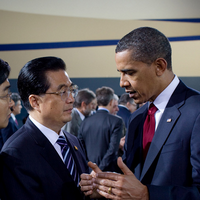 No credible international affairs specialist would contend that the 2012 presidential election will hinge on U.S. foreign policy, given the state of the U.S. economy and the widespread social anger that one sees bubbling up across the country. What's more, Americans -- if not Beltway partisan pundits -- have achieved a certain sense of consensus on foreign policy under President Barack Obama, whose leadership has displayed a palpable "give them what they want" dynamic that reflects his desire to keep overseas issues on the back burner while he focuses on domestic ones.
No credible international affairs specialist would contend that the 2012 presidential election will hinge on U.S. foreign policy, given the state of the U.S. economy and the widespread social anger that one sees bubbling up across the country. What's more, Americans -- if not Beltway partisan pundits -- have achieved a certain sense of consensus on foreign policy under President Barack Obama, whose leadership has displayed a palpable "give them what they want" dynamic that reflects his desire to keep overseas issues on the back burner while he focuses on domestic ones.
Read the entire column at World Politics Review.
Monday, October 31, 2011 at 10:36 AM
10:36AM
 Monday, October 31, 2011 at 10:36AM
Monday, October 31, 2011 at 10:36AM
 According to the United Nations, today marks the birth of the world’s 7 billionth person, an event sure to cause great angst among the many surviving Malthusians who still believe that humanity’s ingenuity and the planet’s resources are both finite. But thanks to globalization’s continued advance and the modernization it enables, roughly four-fifths of humans live in societies with falling birth rates and half live in societies featuring lower than replacement-rate fertility. So we now know that the trajectory of global population growth will proceed somewhat more slowly toward our eighth and ninth billions, and that we may never reach the 10th.
According to the United Nations, today marks the birth of the world’s 7 billionth person, an event sure to cause great angst among the many surviving Malthusians who still believe that humanity’s ingenuity and the planet’s resources are both finite. But thanks to globalization’s continued advance and the modernization it enables, roughly four-fifths of humans live in societies with falling birth rates and half live in societies featuring lower than replacement-rate fertility. So we now know that the trajectory of global population growth will proceed somewhat more slowly toward our eighth and ninth billions, and that we may never reach the 10th.
Read the entire column at World Politics Review.
Monday, October 24, 2011 at 9:57 AM
9:57AM
 Monday, October 24, 2011 at 9:57AM
Monday, October 24, 2011 at 9:57AM
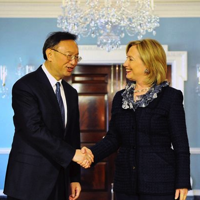 As part of a “big think” forecast project commissioned by an intelligence community sponsor, I’ve begun to think about the future geography of global security. As often with this kind of project, I find myself falling into list-making mode as I contemplate slides for the brief. So here are nine big structural issues that I think any such presentation must include . . .
As part of a “big think” forecast project commissioned by an intelligence community sponsor, I’ve begun to think about the future geography of global security. As often with this kind of project, I find myself falling into list-making mode as I contemplate slides for the brief. So here are nine big structural issues that I think any such presentation must include . . .
Read the entire column at World Politics Review.
Monday, October 17, 2011 at 9:00 AM
9:00AM
 Monday, October 17, 2011 at 9:00AM
Monday, October 17, 2011 at 9:00AM
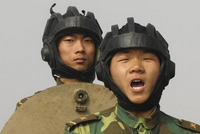 There exists within the Pentagon an unshakeable line of reasoning that says the Chinese military threat to the United States in Asia is profound and growing, that the most likely great-power war conflict will be over Taiwan or the South China Sea, and that the primary trigger will be China's burgeoning -- and uncontrollable -- nationalism. Objectively, China's military capabilities are certainly growing dramatically, but our conventional wisdom tends to break down in the structural plausibility of the scenarios. That's why the firm belief that rampant nationalism will trigger an eventual conflict becomes so crucial, especially when considered in combination with an additional line of speculation that emerged earlier this year, after the Chinese military trotted out a fifth-generation fighter jet the same day that former U.S. Defense Secretary Robert Gates arrived in Beijing for confidence-building talks: At the time, Gates suggested that maybe the People's Liberation Army was getting too big for its britches, and according to those who emphasize the Chinese threat, when the Chinese Communist Party eventually caves in the face of out-of-control popular nationalism, the PLA will step in and take matters into its own hands.
There exists within the Pentagon an unshakeable line of reasoning that says the Chinese military threat to the United States in Asia is profound and growing, that the most likely great-power war conflict will be over Taiwan or the South China Sea, and that the primary trigger will be China's burgeoning -- and uncontrollable -- nationalism. Objectively, China's military capabilities are certainly growing dramatically, but our conventional wisdom tends to break down in the structural plausibility of the scenarios. That's why the firm belief that rampant nationalism will trigger an eventual conflict becomes so crucial, especially when considered in combination with an additional line of speculation that emerged earlier this year, after the Chinese military trotted out a fifth-generation fighter jet the same day that former U.S. Defense Secretary Robert Gates arrived in Beijing for confidence-building talks: At the time, Gates suggested that maybe the People's Liberation Army was getting too big for its britches, and according to those who emphasize the Chinese threat, when the Chinese Communist Party eventually caves in the face of out-of-control popular nationalism, the PLA will step in and take matters into its own hands.
Read the entire column at World Politics Review.
Monday, October 10, 2011 at 9:03 AM
9:03AM
 Monday, October 10, 2011 at 9:03AM
Monday, October 10, 2011 at 9:03AM
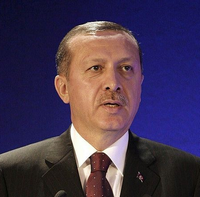 "Resource wars" enthusiasts worldwide have a new -- and unexpected -- poster child:"zero problems with neighbors" Turkey. The Turkish government of Prime Minister Recep Tayyip Erdogan is beside itself over Israel's recent moves to cooperate with Cyprus on surveying its Eastern Mediterranean seabed for possible natural gas deposits thought to be lying adjacent to the reserves discovered last year off the coast of Haifa.
"Resource wars" enthusiasts worldwide have a new -- and unexpected -- poster child:"zero problems with neighbors" Turkey. The Turkish government of Prime Minister Recep Tayyip Erdogan is beside itself over Israel's recent moves to cooperate with Cyprus on surveying its Eastern Mediterranean seabed for possible natural gas deposits thought to be lying adjacent to the reserves discovered last year off the coast of Haifa.
Read the entire column at World Politics Review.
Tuesday, October 4, 2011 at 12:01 AM
12:01AM
 Tuesday, October 4, 2011 at 12:01AM
Tuesday, October 4, 2011 at 12:01AM
 Last month I spent a couple of hours on the phone being interviewed for the next iteration of the National Intelligence Council's global futures project. This one imagines the world in 2030, and the interview was part of the organization's early polling process of experts around the world. I've participated similarly in previous iterations, and I've always found the NIC's questions fascinating for how they reveal the group's primary fears about the future.
Last month I spent a couple of hours on the phone being interviewed for the next iteration of the National Intelligence Council's global futures project. This one imagines the world in 2030, and the interview was part of the organization's early polling process of experts around the world. I've participated similarly in previous iterations, and I've always found the NIC's questions fascinating for how they reveal the group's primary fears about the future.
Read the entire column at World Politics Review.
Monday, September 26, 2011 at 10:40 AM
10:40AM
 Monday, September 26, 2011 at 10:40AM
Monday, September 26, 2011 at 10:40AM
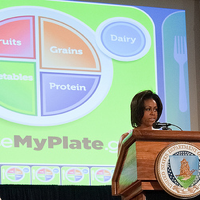 The real clash of civilizations in the 21st century will be not over religion, but over food. As the emerging East and surging South achieve appreciable amounts of disposable income, they're increasingly taking on a Western-style diet. This bodes poorly for the world on multiple levels, with the most-alarmist Cassandras warning about imminent resource wars. But the more immediate and realistic concern is the resulting health costs, which will inevitably trigger a rule-set clash between nanny-state types hell-bent on "reining in" a number of globalized industries -- agriculture, food and beverages, restaurants, health care and pharmaceuticals -- and those preferring a more free-market/libertarian stance.
The real clash of civilizations in the 21st century will be not over religion, but over food. As the emerging East and surging South achieve appreciable amounts of disposable income, they're increasingly taking on a Western-style diet. This bodes poorly for the world on multiple levels, with the most-alarmist Cassandras warning about imminent resource wars. But the more immediate and realistic concern is the resulting health costs, which will inevitably trigger a rule-set clash between nanny-state types hell-bent on "reining in" a number of globalized industries -- agriculture, food and beverages, restaurants, health care and pharmaceuticals -- and those preferring a more free-market/libertarian stance.
Read the entire column at World Politics Review.
Monday, September 19, 2011 at 8:49 AM
8:49AM
 Monday, September 19, 2011 at 8:49AM
Monday, September 19, 2011 at 8:49AM
 Thanks to the Sept. 11 terrorist attacks and the wars they spawned, many people around the world think they're living through the most dangerous, violent and strategically uncertain period in human history. Well, that simply isn't true, as the most recent Human Security Report from Canada's Simon Fraser University makes clear. Entitled, "The Causes of Peace and the Shrinking Costs of War," the 2009-2010 edition of the annual report marshals a ton of solid data that proves our world is less violent than ever and that it has "become far less insecure over the past 20 years."
Thanks to the Sept. 11 terrorist attacks and the wars they spawned, many people around the world think they're living through the most dangerous, violent and strategically uncertain period in human history. Well, that simply isn't true, as the most recent Human Security Report from Canada's Simon Fraser University makes clear. Entitled, "The Causes of Peace and the Shrinking Costs of War," the 2009-2010 edition of the annual report marshals a ton of solid data that proves our world is less violent than ever and that it has "become far less insecure over the past 20 years."
Read the entire column at World Politics Review.
Monday, September 12, 2011 at 8:34 AM
8:34AM
 Monday, September 12, 2011 at 8:34AM
Monday, September 12, 2011 at 8:34AM
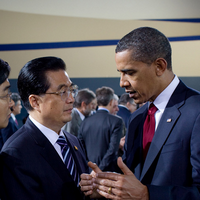 The 10th anniversary of the Sept. 11 terrorist attacks has garnered America almost as much schadenfreude from the world as the original events did. Back in 2001, the line was that we had it coming to us for lording it over the world since the Cold War's end. Today, it takes the form of writing off our alleged "hegemony" in light of the shifts in global power over the intervening decade, a claim that is as absurd the previous one was insulting. Naturally, the Chinese are celebrated as our presumed replacement. So, as always throughout our history as a superpower, we're being treated to "sophisticated" analysis that says America fought the war, but they -- our next security obsession -- won the peace.
The 10th anniversary of the Sept. 11 terrorist attacks has garnered America almost as much schadenfreude from the world as the original events did. Back in 2001, the line was that we had it coming to us for lording it over the world since the Cold War's end. Today, it takes the form of writing off our alleged "hegemony" in light of the shifts in global power over the intervening decade, a claim that is as absurd the previous one was insulting. Naturally, the Chinese are celebrated as our presumed replacement. So, as always throughout our history as a superpower, we're being treated to "sophisticated" analysis that says America fought the war, but they -- our next security obsession -- won the peace.
Read the entire column at World Politics Review.
Monday, September 5, 2011 at 9:59 AM
9:59AM
 Monday, September 5, 2011 at 9:59AM
Monday, September 5, 2011 at 9:59AM
 Prior to the Fukushima nuclear power plant disaster in Japan, the nuclear energy industry was poised for a global expansion of unprecedented size. Proponents of nuclear energy still see a bright future in a world where electrical demand grows hand in hand with a burgeoning global middle class and everybody wants to reduce CO2 emissions. But vociferous industry opponents now claim nuclear power has been dealt a Chernobyl-like deathblow. Unsurprisingly, most pessimists are found in the advanced West -- witness Germany's decision to abandon nuclear power -- while most optimists are found in emerging economies such as China and India.
Prior to the Fukushima nuclear power plant disaster in Japan, the nuclear energy industry was poised for a global expansion of unprecedented size. Proponents of nuclear energy still see a bright future in a world where electrical demand grows hand in hand with a burgeoning global middle class and everybody wants to reduce CO2 emissions. But vociferous industry opponents now claim nuclear power has been dealt a Chernobyl-like deathblow. Unsurprisingly, most pessimists are found in the advanced West -- witness Germany's decision to abandon nuclear power -- while most optimists are found in emerging economies such as China and India.
Read the entire post at World Politics Review.

Monday, August 22, 2011 at 9:37 AM
9:37AM
 Monday, August 22, 2011 at 9:37AM
Monday, August 22, 2011 at 9:37AM
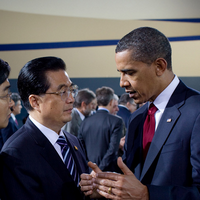
Ian Bremmer, the founder and head of Eurasia Group (for which I work as an analyst), has argued that we are living in a "G-Zero" world, or one in which there is no genuine great-power leadership. From the perspective of political science, it is hard to disagree, as anyone reading a newspaper these days can attest. Still, the historian in me says this situation cannot last for too long. My reasoning here has nothing to do with the global correlation of military force, since thanks to globalization's emerging middle class, "butter" will inevitably emerge as the winner over "guns."
Read the entire column at World Politics Review.
Monday, August 15, 2011 at 9:34 AM
9:34AM
 Monday, August 15, 2011 at 9:34AM
Monday, August 15, 2011 at 9:34AM
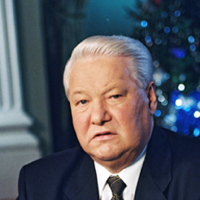 When the Berlin Wall fell in 1989, I was completing my doctoral dissertation on Warsaw Pact-Third World relations. I immediately understood that my time in Soviet studies was done. Why? Because I knew that Russia was full of brilliant political scientists who, once free to pursue their craft free of ideological constraints, would do a better job explaining things there than outsiders could.
When the Berlin Wall fell in 1989, I was completing my doctoral dissertation on Warsaw Pact-Third World relations. I immediately understood that my time in Soviet studies was done. Why? Because I knew that Russia was full of brilliant political scientists who, once free to pursue their craft free of ideological constraints, would do a better job explaining things there than outsiders could.
The generation of Russian scholars that emerged in the post-Soviet era proved me right, and none has consistently impressed more than Dmitri Trenin, who heads up the Moscow office of the Carnegie Endowment for International Peace . . .
Read the entire column at World Politics Review.
Monday, August 8, 2011 at 10:56 AM
10:56AM
 Monday, August 8, 2011 at 10:56AM
Monday, August 8, 2011 at 10:56AM
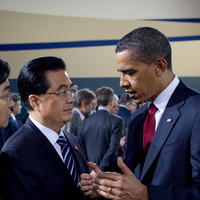 This month's debt-ceiling deal in Washington did little to quell the growing chorus of complaints around the world concerning America's continued inability to live within its means. As those complaints invariably translate into corporate hedging, government self-defense strategies, credit rating drops -- Standard and Poor's is already in the bag -- and market short-selling, the U.S. will most assuredly be made to feel the world's mounting angst. This is both right and good, even as it is unlikely to change our path anytime soon: Until some internal political rebalancing occurs, America will invariably stick to its current cluster of painfully outdated strategic assumptions.
This month's debt-ceiling deal in Washington did little to quell the growing chorus of complaints around the world concerning America's continued inability to live within its means. As those complaints invariably translate into corporate hedging, government self-defense strategies, credit rating drops -- Standard and Poor's is already in the bag -- and market short-selling, the U.S. will most assuredly be made to feel the world's mounting angst. This is both right and good, even as it is unlikely to change our path anytime soon: Until some internal political rebalancing occurs, America will invariably stick to its current cluster of painfully outdated strategic assumptions.
Read the entire column at World Politics Review.
Monday, August 1, 2011 at 10:33 AM
10:33AM
 Monday, August 1, 2011 at 10:33AM
Monday, August 1, 2011 at 10:33AM
 Despite the rush right now to declare important milestones or turning points in the fight against terrorism, the best handle we can get on the situation seems to be that al-Qaida is near dead, but its franchises have quite a bit of life in them. The implied situational uncertainty is to be expected following Osama Bin Laden's assassination, as he was our familiar "handle" on the issue for more than a decade. But although it is normal that we now seek a new, widely accepted paradigm, it is also misguided: In global terms we are, for lack of a better term, in a good place right now on terrorism, meaning we don't need to unduly demote or elevate it in our collective threat priorities. Instead, we need to recognize the "sine wave" we're riding right now and seek no profound rebalancing in our security capabilities -- other than to continue protecting the "small wars" assets that we spent the last decade redeveloping.
Despite the rush right now to declare important milestones or turning points in the fight against terrorism, the best handle we can get on the situation seems to be that al-Qaida is near dead, but its franchises have quite a bit of life in them. The implied situational uncertainty is to be expected following Osama Bin Laden's assassination, as he was our familiar "handle" on the issue for more than a decade. But although it is normal that we now seek a new, widely accepted paradigm, it is also misguided: In global terms we are, for lack of a better term, in a good place right now on terrorism, meaning we don't need to unduly demote or elevate it in our collective threat priorities. Instead, we need to recognize the "sine wave" we're riding right now and seek no profound rebalancing in our security capabilities -- other than to continue protecting the "small wars" assets that we spent the last decade redeveloping.
Read the entire column at World Politics Review.
 Monday, December 19, 2011 at 9:58AM
Monday, December 19, 2011 at 9:58AM Much of what drives America’s current phobias regarding China stems from the dual -- and fantastically linear -- assumptions of America’s terminal decline and China’s perpetual ascension. We are thus led to believe that China no longer needs the United States and that America, in turn, can do nothing -- short of increasing military pressure -- to constrain the Middle Kingdom’s rise to global hegemony. On all scores, nothing could be further from the truth. China and the United States suffer a level of strategic interdependency that is vast and shows no signs of reduction. Simply put, America cannot stay rich without China, and China cannot get rich without America.

 China,
China,  US,
US,  global economy,
global economy,  globalization | in
globalization | in  WPR Column |
WPR Column |  Email Article |
Email Article |  Permalink |
Permalink |  Print Article
Print Article 














































